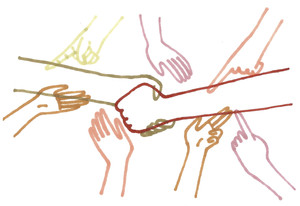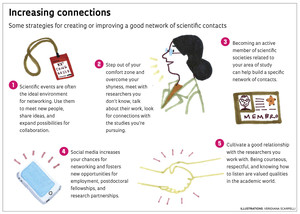 VERIDIANA SCARPELLIMost research projects today involve researchers from different academic areas and institutions, whether public or private, in collaborations often conceived through informal conversations held during breaks at conferences, symposia, and workshops, or via the internet, through social networks. In many cases scientists become aware of new job opportunities, or are accepted at laboratories at universities and companies in Brazil or abroad through referrals or recommendations from other researchers with whom they’ve made connections. Investing in the creation or improvement of a good contact network is important for expanding job opportunities and partnerships in research projects, contributing directly or indirectly to career development.
VERIDIANA SCARPELLIMost research projects today involve researchers from different academic areas and institutions, whether public or private, in collaborations often conceived through informal conversations held during breaks at conferences, symposia, and workshops, or via the internet, through social networks. In many cases scientists become aware of new job opportunities, or are accepted at laboratories at universities and companies in Brazil or abroad through referrals or recommendations from other researchers with whom they’ve made connections. Investing in the creation or improvement of a good contact network is important for expanding job opportunities and partnerships in research projects, contributing directly or indirectly to career development.
Building a network of scientific contacts can be done in several ways. When reading a study in a prestigious journal, the researcher can try to contact the lead authors and exchange ideas on subjects of interest and possible collaborations. However, scientific events are usually the ideal environment for this type of activity, allowing researchers to present their work and demonstrate their competency, interact with other scientists, and keep abreast of current discussions and trends in their area of research. Often these interactions can result in scientific collaborations, letters of recommendation, and opportunities for writing and reviewing scientific articles, among other benefits.
For undergraduates developing research internship projects, a discussion with their academic advisor is recommended so that together they can choose the most relevant scientific events. The selection should prioritize events where it’s possible to present works either in poster form or orally. After the presentation, if the advisor is present, it is worthwhile to ask for introductions to more experienced researchers working in similar areas. The discussions that follow these introductions are usually valuable and can foster the types of social interaction described above, helping to build or improve one’s contact network.
 VERIDIANA SCARPELLIFor master’s and doctoral researchers, attending larger events that include researchers from Brazil and abroad may be the best strategy. During these informal discussions it’s possible to learn about difficulties and shortcomings colleagues may be experiencing in their work, increasing the possibilities for collaboration and reinforcing connections. “It’s important to use these meetings to make your interest clear, ask questions, exchange information, create new contacts, and thereby build or strengthen your reputation as a collaborative and interactive scientist,” says Brazilian biologist Alysson Muotri, a professor at the School of Medicine at the University of California, San Diego. He recommends that in such situations students step out of their comfort zone and overcome their shyness, meet with researchers they don’t know, talk about their work, and look for connections with the studies they’re pursuing.
VERIDIANA SCARPELLIFor master’s and doctoral researchers, attending larger events that include researchers from Brazil and abroad may be the best strategy. During these informal discussions it’s possible to learn about difficulties and shortcomings colleagues may be experiencing in their work, increasing the possibilities for collaboration and reinforcing connections. “It’s important to use these meetings to make your interest clear, ask questions, exchange information, create new contacts, and thereby build or strengthen your reputation as a collaborative and interactive scientist,” says Brazilian biologist Alysson Muotri, a professor at the School of Medicine at the University of California, San Diego. He recommends that in such situations students step out of their comfort zone and overcome their shyness, meet with researchers they don’t know, talk about their work, and look for connections with the studies they’re pursuing.
One way to make the most of these events is to prepare in advance, by analyzing and selecting the lectures you wish to attend, and studying the CVs of the speakers who work on related subjects. During the event, try to arrange meetings to discuss ideas and exchange cards, and then follow up with these contacts later to continue the dialogue.
“Researchers, at a university or a company, need to know what they want—and keep in mind that networking is a two-way street. It must be done responsibly,” says chemical engineer Wang Shu Chen, a researcher at the Saint-Gobain Research and Development Center in Brazil. Chen was invited to work at Saint-Gobain after the multinational bought Adespec, the adhesive technology company she founded in 2001. She had worked for other glue and adhesive manufacturers for many years, establishing a variety of connections that later helped her start her own company.
 Biologist Diogo Biagi adds, “When I was in college, I largely concerned myself with networking in order to have more possibilities for scientific collaboration. Today, at the company, I use networking to find people who can help me solve problems in the area of research and development.” Biagi is one of the founding partners of Pluricell Biotech, a startup dedicated to the production and commercialization of induced pluripotent stem cells, mature cells that can be reprogrammed to generate different types of tissues.
Biologist Diogo Biagi adds, “When I was in college, I largely concerned myself with networking in order to have more possibilities for scientific collaboration. Today, at the company, I use networking to find people who can help me solve problems in the area of research and development.” Biagi is one of the founding partners of Pluricell Biotech, a startup dedicated to the production and commercialization of induced pluripotent stem cells, mature cells that can be reprogrammed to generate different types of tissues.
He says that in the early days of the startup he used his network of contacts to gain access to the innovation directors at large cosmetic companies. After various meetings, he was able to establish partnerships with some of them. “Another interesting example was when I was attending a scientific event for Brazilians at Harvard in the United States. After the meeting most people left, but a few of us went out to a pub to talk. There, I was introduced to a Brazilian researcher with a company in Canada, and today we’re talking about a partnership for product development.”
Investing in building a good network of contacts also means cultivating good relationships with the researchers the individual is already working with. To this end, the recommendation of senior researchers is to apply the basic rules of etiquette in such a way as to facilitate contact with colleagues. “Being courteous, respectful, knowing how to listen, and speaking in a moderate tone of voice are valued qualities in the international academic world,” says Muotri. He adds that investing in a healthy and productive relationship with laboratory colleagues, from the undergraduate to the student’s faculty advisor, is important in the long term, such as when requesting letters of recommendation or referrals for new positions. “I like to compliment my colleagues when they publish interesting work, and I enjoy discussing science with people from other areas, and I notice that these habits help me maintain my contact network.”
Today, with the development of technology, networking can be done through social networks. A survey by Springer Nature covering more than 3,000 researchers from the United States, Europe, and Asia found that more than 70% of respondents acknowledge that they should use and promote their research on social networks more diligently.
“Like most digital tools, social media can expand opportunities for networking and even help with finding jobs, postdoctoral fellowships, or research partnerships,” explains Wang Shu Chen. Among the best known are Academia.edu and ResearchGate, social networks specifically for researchers. The survey also found that 68% of them keep their profiles active on these platforms just in case someone wants to get in touch. Google Scholar is another tool that helps with communication between scientists. According to the study, 66% of respondents use the platform.
On LinkedIn, the business social network, you can join groups related to your areas of interest and share information on new research, equipment, and job opportunities. Twitter can also be useful: in recent years, the microblogging service has become one of the main platforms for the dissemination and discussion of scientific studies, according to an article published in 2014 by the scientific journal PLOS One.
A good example of how technology can be useful in this regard is that of mathematician Jackson Itikawa, who is currently doing his postdoctoral studies at the Institute of Mathematical and Computer Sciences at the University of São Paulo (ICMC-USP) in São Carlos. He was one of the finalists of FameLab, a science communication competition held in June 2016 during the Cheltenham Science Festival in England (see Pesquisa FAPESP, issue No. 246). Itikawa competed with participants from the United States, the United Kingdom, and South Korea, among others. “I learned a lot about science outreach, but the best networking that resulted from FameLab was with the other Brazilian finalists during the national stage. We have a WhatsApp group today for discussing research and education in Brazil, career achievements, sharing opportunities etc.”
Wang Shu Chen adds that for networking to be effective, researchers need to seek to relate to people in a more general way, not just as a way to leverage their career.
Republish